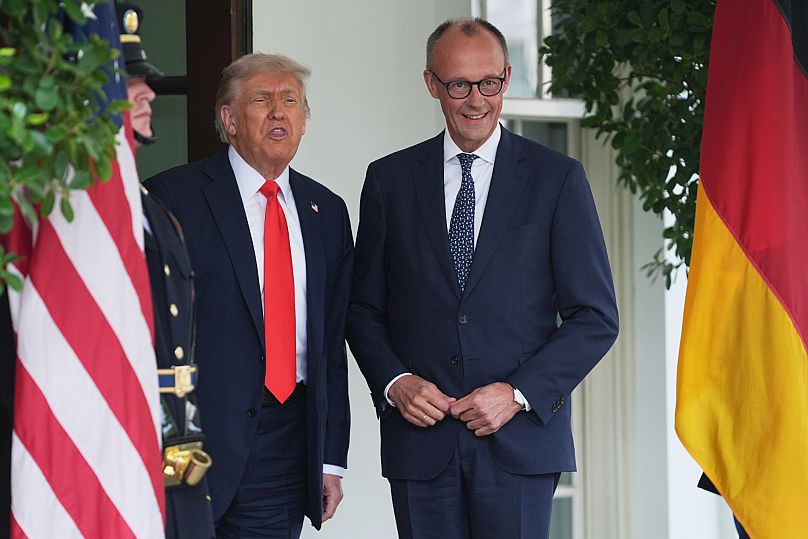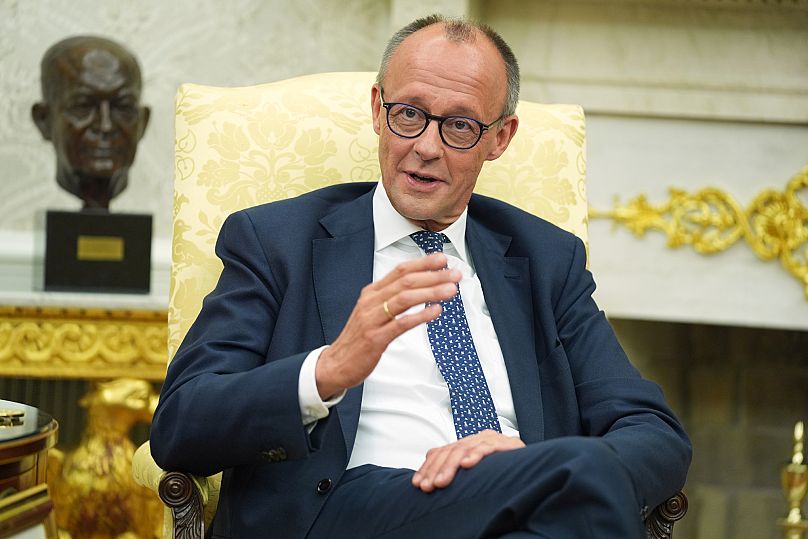Having been elected Germany's chancellor just a few weeks prior, Friedrich Merz's visit to the White House on Thursday turned out to be his first major test in foreign relations — and how to remain calm when things got awkward.
His meeting with US President Donald Trump was going quite well, until Trump said D-Day did not end well for Germany during his first visit to Washington.
"That was not a pleasant day for you," the US president responded to Merz's words on the Allied invasion of Normandy in World War II and the German chancellor's comment that "that was when Americans liberated Europe".
"Well, in the long run, Mr President, this was the liberation of my country from Nazi dictatorship," Merz replied. "We know what we owe you."
And he successfully steered the conversation back on track: the three topics that were most important during the meeting were defence spending, tariffs and Ukraine. According to a press statement released by Merz shortly before the meeting, the German side was well prepared for the conversation.
German Council of Foreign Relations senior research fellow Rachel Tausenfreund said the meeting "could not have gone better for Merz."
Tausenfreund says Merz's answers were "well crafted" and that "specifics over the tough trade negotiations were avoided."
Trump said the White House was in good shape, that the new administration had "fixed it up, and having it tippy toppy" like "they have in Germany."
On Ukraine
Trump said both leaders feel it is "very sad" what is going on in Ukraine and added that between five and six thousand soldiers a week are being killed there.
The US president mentioned the 75-minute phone conversation he had had with Russian President Vladimir Putin on Wednesday, where Putin reportedly promised to retaliate to Ukraine's drone strike operation deep inside Russia on Sunday that took out a third of the country's bombers.
Trump said that he didn't think Putin was "playing games," and blamed former US President Joe Biden for Russia's full-scale invasion. Trump also said he thinks Putin wants "the whole thing," referring to all of Ukraine.
Merz suggested that Germany and the US should play a joint role in ending the war.
Merz also underlined the good relationship between Germany and the US and said he was looking forward to "good cooperation" between both nations.

On military matters
Merz highlighted Germany's commitment to NATO after the government locked in billions of euros of additional defence spending.
Relations between Germany and the US had grown frosty, particularly after the Trump administration accused Europe of "freeloading," regarding NATO and defence spending.
The US administration is frustrated over what it views as insufficient European contributions.
"We want to have the strongest conventional army in Europe," Merz said in the press release ahead of the conference.
Trump welcomed the increase in Germany's spending on defence, although he suggested he would eventually cap Germany's efforts to rearm.
Merz said that Europe still needs US support and friendship ahead of Friday's D-Day anniversary.
Senior research fellow at the German Marshall Fund Jackson Janes told Euronews that "Trump emphasised that he sees value in the presence of American troops in Germany."
"Merz underscored the standing legacy of 6 June as the symbol of the American engagement in ending the World War II and 'liberating' Germany, for which Germans remain grateful," Janes explained.
Janes added that Merz was able to link that to the war in Ukraine and the need to stop that war now, whilst labelling Russia as the instigator. Merz expressed the need to increase pressure on Russia to end the aggression.
Trump claimed that under the Biden administration, the numbers for US recruitment for the army were the lowest ever, but now they have broken records. Merz asked how to do it, as Germany has been having a tough time filling reserves, to which Trump replied: "Spirit. They love our country again and you're going to do the same thing."
Trump called Merz "difficult" but a good man and said he could imagine US troops would remain in Germany.
Director of the Aspen Institute Dr Stormy-Annika Mildner said that whilst confrontational with tariff threats and talk of troop withdrawals, "this partnership requires more active management than ever. All the more important, then, that Chancellor Merz sought an early dialogue in Washington."
Differences between nations
"It seems good work was done ahead of time to let Trump know that Merz had different positions from Merkel on issues which are important to Trump. Trump seemed eager to position himself as a friend to Merz," Tausenfreund added.
On the topic of Trump's recent US travel ban on citizens from 12 countries, the US president said: "I even hate to say this in front of the chancellor, but you have a little problem too with some of the people you let in. It's not your fault."
Trump further suggested he had warned former German Chancellor Angela Merkel not to open the borders in 2015 to allow over a million Syrian refugees in.
Regarding tariffs, Europe is in danger of becoming flooded by steel after Trump increased tariffs on aluminium and steel to 50%.

Aside from that, the EU is also facing a 25% tariff on cars and a 10% levy on all other imports.
The US has also launched several investigations into the pharmaceutical, semiconductor and aircraft industries that could lead to further tariffs. Trump has further threatened to impose a 50% tariff on all EU goods as of 9 July if negotiations fail to meet his expectations.
Dr Mildner told Euronews that the relationship with the US remains central to Germany "both economically and politically."
On the subject of China and Trump's phone call with leader Xi Jinping, Trump said they struck a deal, but they needed to make sure "everyone understands what the deal is."
He also said Xi will be visiting the US, and he'll be visiting China with US First Lady Melania Trump.
"This encounter was a start Merz in establishing a basis for many issues to come. European-US relations remain full of tough challenges and Merz will potentially become a key partner for Trump in navigating that process," Janes said.
He concluded that Merz likely earned some credit in Washington, "as well as in his domestic base at home. But that will require a lot more investment over the next three years - and beyond."







